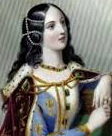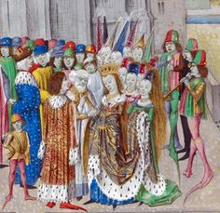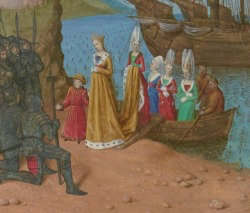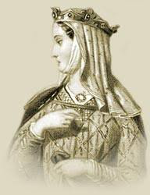Isabella of France
Isabella, wife of England's King Edward II, has come to be known as "the She-Wolf of France" for her part in her husband's abdication and her son's ascension to the throne. She was born in Paris in 1295. The exact date of her birth is not known. Her father was King Philip IV of France; her mother was Queen Joan I of Navarre. Her father as known to very good-looking and her mother not as much; Isabella, by accounts of the time, took after her father in this regard. She had three brothers, Louis, Philip, and Charles. Theirs was an especially royal family because all three brothers became King of France in their own right. 
Isabella grew up at court and had access to a good amount of education. She learned to read and found that she really liked reading books. She was also very smart and quickly learned how to negotiate and how to operate at court. She was just 2 when she was promised to marry Edward, the young son of King Edward I of England, who was then marrying again, to Margaret of France, her aunt. Thus, Isabella grew up knowing that she was going to marry at a young age. 
She was married to Edward when she was 12, in a lavish ceremony in Boulogne, on January 25, 1308. As the daughter of Philip, the King of France, she received many lavish wedding presents. Her husband later gave most of these wedding presents to Piers Gaveston, his dedicated favorite at court. Further, when the royal pair returned to England and attended a lavish coronation ceremony, Edward spent more time with Gaveston than with her. He also did not grant her her own lands or household, as was the custom. At a suggestion from Isabella's father, relations between the king and queen improved somewhat. They eventually had four children together: Edward, John, Eleanor, and Joan. Edward was an unconventional king. He preferred not the usual trappings of militarily inclined men of the time, like falconry and hunting and jousting, but more urbane pursuits, like music and poetry. He also preferred the company of Gaveston to just about anyone else, including his wife. Isabella saw this and tried to get along with both. She did have some friends in Edward's court who were suspicious of Gaveston's influence on her husband. Among those were Thomas, the Earl of Lancaster, and he Beaumont family, friends of her mother. Isabella had accompanied her husband on campaign against Scotland in 1311. The result was not good for England, and both the king and queen were nearly captured. Edward, who had provoked a stern quarrel with his barons, agreed to the Ordinances of 1311, one of the provisions of which was the exile of Gaveston. Isabella no doubt found this development to her liking but was at the same distressed because also exiled were her friends and allies the Beaumonts. Still, she stood by her husband in his struggle against the barons; her reward was to be put away at Tynemouth Priory in Northumberland while Edward conducted the business of war. The events of 1312 saw the death of Gaveston and the birth of Isabella's first son, Edward. Isabella soon found that Edward had replaced one favorite with another. Hugh Despenser had served Edward I; now, he was at the court of Edward II, along with his son, also named Hugh, and it was Hugh the Younger who became Edward's new chief advisor. Edward suffered twin disasters in 1314–1315, losing the monumental Battle of Bannockburn to Scotland and losing much support and political capital through no fault of his own as the Great Famine gripped England and Europe. Isabella's second son, John, was born in 1316. About this time, Isabella asserted her skills as a diplomat in attending more council meetings. Edward, preoccupied with Young Hugh and his various wars, did not object. Isabella and Gaveston had found a way to work together or at least around each other; the same was not true for Young Hugh Despenser. When Edward's favoritism for him was so flagrant that the barons again threatened war, Isabella personally intervened, imploring Edward to send the Despensers away as he had Gaveston a few years earlier. Edward would not yield this time, and the barons rose up in rebellion. Edward was more successful fighting this rebellion and crushed the barons at the Battle of Boroughbridge in 1322. He exulted by executing Lancaster and a handful of other barons and giving their lands to the Despensers. The exultant king and his favorite advisor set about exacting revenge, imposing a harsh rule over the country, seizing land left and right, including castles once belonging to Isabella. Later that year, Isabella accompanied Edward on yet another expedition to fight the Scottish forces in the north and narrowly escaped capture when Edward abandoned her in order to ride south to raise another army. At the end of that year, Isabella embarked on a monthslong tour of England, by herself. When she returned, in 1323, she greeted her husband and was greeted by him with a demand that she take an oath of loyalty to the Despensers. She refused. In the months that followed, Isabella lost control of her lands, her household staff and even her children, who were placed under the custody of the Despensers. Isabella's brother Charles had succeeded their father as King of France in 1322. In 1325, he seized Edward's lands in France and Edward sent Isabella to France on his behalf. Edward also sent his son Edward to pay homage to Charles on behalf of England. Isabella did indeed negotiate a truce between England and France, avoiding war between the two nations. She also took steps to start a war of her own–against her husband. She had finally had enough of the ill treatment by Edward and, especially, by Hugh Despenser the Younger. She considered Edward no longer fit to rule England, and she set about finding allies in an attempt to depose him. One of the most willing was Roger Mortimer, a Marcher lord who had risen up against Edward in the second rebellion and was imprisoned afterward in the Tower of London. Mortimer managed a daring escape by chipping away a hole in the stone wall of his cell and then making his way to the roof and scaling a rope ladder down the tower wall to freedom. He was in France at this time, and he and Isabella had a meeting of the minds. (Some historians have suggested that their relationship was more of a physical nature.) 
Isabella and Mortimer, with young Edward in tow, raised an army and sailed back to England. They marched against Edward, gaining allies as they went. King Edward attempted to hunker down in London, but the city turned against him. He and the Despensers fled the city on October 2. A mob set about ravaging the city and killing Edward's supporters and members of his household. Meanwhile, Mortimer and Isabella and their army pursued the king. They found him in Wales, and an armed guard took him first to Monmouth Castle and then to Kenilworth, a fortress belonging to Lancaster. Out of options, Edward agreed to abdicate. He did so on January 21, 1327. His son was crowned King Edward III on February 2. Mortimer and Isabella were declared regents. The regency lasted four years. In 1328, Isabella saw her son married, to Philippa of Hainault, a political payback for those who supported the struggle against Isabella's husband. During this period, both Isabella and Mortimer acquired a large amount of land and money. Isabella provided the solution to yet another England-Scotland fight, with her daughter Joan marrying Scotland's heir-apparent David Bruce, son of King Robert the Bruce. The terms of the Treaty of Northampton, which sealed the alliance, angered many of the English barons, including one of Isabella's key allies, Henry of Lancaster, brother of her husband's old foe Thomas. Lancaster eventually broke with Edward III and his regents and mobilized an army. Edward responded by marching at the head of his own army to Leicester, Lancaster's stronghold. Isabella, wearing armor and riding a horse, accompanied her son on this venture. Another baron who was angered by the Scottish peace was Henry de Beaumont, Isabella's lifelong family friend. Beaumont had thrown in his lot with Lancaster, and the two barons received the same punishment, meted out by Isabella herself: not death but the loss of their fortunes. In 1330, Edward had seen and ordered his troops to arrest Mortimer. Isabella's confidant was tried and convicted of treason and executed. Edward declared himself king in his own right and ordered his mother to be put under house arrest. 
Isabella lived in this condition until 1332, when she transferred her belongings to one of her own castles, Rising, in Norfolk. She retained much of her wealth. Edward found a use for his mother in 1348 and 1358, sending her back to France to defuse flareups there. She also read widely. She was particularly fascinated by the legends of King Arthur, an interest that she had shared with Mortimer. She remained friendly with members of his family. She became more religious in her old age and visited shrines around the country. She joined the Poor Clares in her last days. Her daughter Joan was also with her near the end. Isabella died on August 22, 1358. |
|




